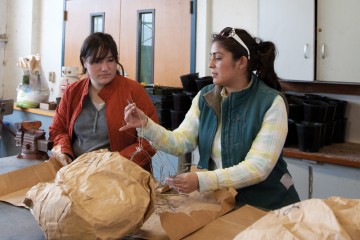
Although they may not put on major advertising campaigns, the Fresno State horticulture nursery and floral shop are keeping busy without any extra attention. The nursery manager and floral manager said they both have plenty of work to do to prepare for spring.
The horticulture nursery grows more than35 varieties of tomatoes, herbs, peppers and eggplants. The nursery also produces cuttings for landscaping plants.
The nursery’s products are distributed many ways. In the spring, the nursery sells herbs and starter plants at the Rue and Gwen Gibson farm market. Every semester, the nursery has two Saturday sales open to the public. It also runs a delivery program in which clients can order plants from a list sent out every Monday. That Friday the plants will be delivered in person by nursery staff.
“It’s fun to go on campus with trays of plants when we do deliveries,” said Calliope Correia, manager of the nursery.
Although it may come as a surprise, she said, winter is actually pretty busy for the nursery.
“We always have our greenhouses and house plants, so that’s going on in the winter. Then we start seeding in December and start our vegetables,” Correia said.
Graduate students from the plant science department use the nursery as a laboratory. Two students are studying crop resistance to the herbicide glyphosate, more commonly known as Round-Up. Gerardo Banuelos is currently studying this herbicide resistance in the invasive plant known as Jungle Rice. Sonia Rios is studying the effects on the invasive plant called Palmer amaranth. Their current studies will become a part of their respective graduate theses.
She said sometimes the culinary students come to collect fresh herbs and take care of the gardens for their classes.
“I think everyone should have to learn about how plants grow,” Correia said.
Correia said it is important to know about different methods of growing and plant propagation. The customers of the nursery get to experience seeing the operation responsible for their plants and produce.
“Since we all use plants, learning about them gives us an opportunity to see how much work goes into growing and producing plants,” Correia said.
Elisa Valdez, the manager of Fresno State Floral, said theknot.com ”” a prominent wedding site ”” rates the lab as a top wedding florist in the central and coastal regions of California. It is also one of five floral shops between Visalia and Berkeley to have a certified florist on staff.
Valdez took steps to become certified and said the process included a written test and a timed hands-on test that is judged by an international board of florists who have nearly 40 years of experience in the field. For the hands-on test, Valdez produced five arrangements in four hours.
“You get the assignment and all of your materials when you get there. There’s no talking and there’s about 100 people watching you. At the end, you have to present your work,” she said.
Fresno State Floral does anywhere from 60 to 100 events every year. Valdez said Fresno State Floral is capable of taking more clients. The lab works with any budget ranging from $300 to $30,000.
The floral lab employs 13 students from a variety of majors. Valdez said most of the students are from the agriculture or plant science departments, but sometimes business students or students getting their event-planning certificate work at the lab.
Fresno State Floral gets its flowers mainly from the central coast, including Nipomo, San Maria and Watsonville.
“We try to only buy California-grown flowers,” Valdez said.
She said Fresno State Floral works closely with the horticulture nursery, which is located in the same building.




